HIT CHANNEL EXCLUSIVE INTERVIEW: January 2025. We had the great honour to talk with a legendary musician: Francis Rossi. He is most well-known as the lead guitarist, lead singer, songwriter and founding member of Status Quo. He wrote or co-wrote iconic songs such as “Pictures of Matchstick Men”, “Caroline”, “Paper Plane”, “Down Down” and “Roll Over Lay Down”. In 2019, he released his autobiography called “I Talk Too Much”. In April, he will start a long solo tour in the UK titled “An Evening of Francis Rossi’s Songs from the Status Quo Songbook and more…”. Read below the very interesting things he told us:
 What should fans expect from your upcoming UK solo tour titled “An Evening of Francis Rossi’s Songs from the Status Quo Songbook and more…”?
What should fans expect from your upcoming UK solo tour titled “An Evening of Francis Rossi’s Songs from the Status Quo Songbook and more…”?
Apart from the long title, there are hopefully a lot of stories. The tunes are written out in a setlist, but none of the stories are going to be like the ones I did the last time I went out. So, I can’t use the same stories but I can’t remember where I told some of the stories. So, I will be asking the audience if I did a certain story and maybe I’ll do it to enjoy it. It’s a lot of the songs that they know but with an acoustic guitar, so, it isn’t so intense, it’s a slightly different thing and it is usually a very enjoyable evening. I enjoy myself. So, even if they only come out, I can enjoy myself, that would be fine.
How emotional was it for you to write your autobiography “I Talk Too Much” (2019)?
Not really, I just like talking. Mick Wall (ed: famous rock journalist and writer) sat over there and asked me questions and talked for 2-3 hours at a time. A few times he did that and then there was a rough draft of the book. I couldn’t read the book, I still didn’t read the book and he just talked to me about when it was written already and I would put certain corrections and that’s all. I didn’t find it emotional at all. I had one of those memories that goes left to right, it isn’t in front of you or behind you. So, when it’s left to right, I could see my brother in the bathroom when I was really small and I could see things like that, just there (ed: left or right). So, whenever I reminisce about things, I very rarely get emotional about them, sometimes quite nostalgic but I don’t linger there because everything is (ed: In our Zoom conversation, he makes a depiction of the horizon using his palms).
It’s like a film with chapters.
Yeah, but most of people think this is there (ed: he points in front of him) on the future and they cannot see behind them, it’s dead. I look and it’s just there (ed: he points to his left). It’s strange.
In your book you write that while you were never going to be able to play guitar to the same jaw-dropping level as an Eric Clapton or Jeff Beck you were determined to become a bloody good songwriter. How much has your approach to songwriting changed over the years?
I don’t know, I hope it’s just gotten better when I went from amateur to professional perhaps. I am not necessarily thinking a professional songwriter is good, because there are certain things you can go about. You could write a song now if you really had to, I’m not saying it will be any good. I don’t think I ever said I wanted to be a good songwriter, I just love to try and write hit songs, they don’t have to be a particular time or heavenly musical or deep in poetic content; they have to make me think: “Yeah! This is something”. I am recording at the moment and there is some thrill in having a song and then constructing it. In particular, these days with computers because you can look at it on the screen, but when we had a tape and a multitrack (ed: recorder) you couldn’t mess around with it. Now, I just can move things on the screen. It gets very-very involved in -for want of a better word- the “creative” side. The word “creative” always sounds to me like someone wonderful and I’ve just been very-very lucky and have written commercial songs that some people have liked and some people see it far more important than others do. I’m just lucky that some people see it as important. I’m a lucky man.
 In your opinion, what makes the music of Status Quo still relevant in 2025?
In your opinion, what makes the music of Status Quo still relevant in 2025?
I don’t know that is relevant. I’m sure to some people is. This is what is interesting about all acts, all bands, all singers, songwriters and actors: If someone is not a fan of yours, then you are not relevant. There are people who think you are great, I am great, whoever is great, but the man next to him, doesn’t think he is great. So, we all think we like good music. No, we like the music we like, therefore, we think it’s great. But it’s neither good nor great, it’s just what you like or I like. The music I like I think it’s great. The music I don’t like I think is shit. But neither is true.
Did you have trouble coming up with new arrangements for your classic songs on the “Aquostic (Stripped Bare)” album in 2014?
Some of them, yes, but some just came easily because there was no parameter, no set thing where it should go. Some things came very easily because you just wanted to do this differently. I heard it recently and I was slightly disappointed. It seemed that whatever we did with strings and such -not that they weren’t good- it was the sound of them, they sounded lacking an emotion. It didn’t seem to be as exciting as I thought it was, but that’s in retrospect. Some songs were hard to do because there were just the two of us in two acoustics. So, certain things you cannot do like the long solos, some of the Status Quo instrumental sections do not translate very well to acoustic. One of the things about an acoustic show is that you get the core of the song (ed: he sings) : “Sing-sing-sing/ sing-sing/ song-song/ chorus/ chorus-chorus/ solo” (ed: he whistles). So, what’s relevant in those things is the actual song, the melody and the basic song, which is what I really enjoy doing.
Are you working on a solo acoustic album or a solo electric one?
It’s a solo album, an FR (ed: Francis Rossi) album, it’s not acoustic by any stretch of imagination. Even I think it’s unusual, because again, it will be maybe the second time I’ve made something that has no script: You don’t have to do this or you have to do that or you mustn’t do this or you mustn’t do that. So, perhaps there are things I’ve done on the album that you couldn’t do on a Status Quo album, because that’s not Status Quo and with Status Quo we had been very successful. There are certain things that being in those parameters are restrictive, but people don’t like you doing this or doing that or doing that (ed: he points to different directions). They really don’t like you drifting and I find that, as I said, very restrictive. “You mustn’t do that because it’s not Quo”. A lot of people said “Rockin’ All Over the World” wasn’t Quo, “Living on an Island”, “Marguerita Time”, “In the Army Now”, various songs, people really got upset saying: “That’s not Quo”. So, it would seem that some people have in their mind what they think is Status Quo. If you mess with that, you are messing with this psyche: “Ah, don’t do this to me!” I found making this album, at the moment, very liberating. I‘ll just do what I think I’m gonna do, whether I think it sounds like this or like that or shouldn’t sound like this or should sound like that. I just do it and think: “Oh, I like that”. I did some stuff yesterday and I am gonna listen to it in a minute and I might think: “No, I don’t like that” and I’ll change it. When you are in a band, you have to be careful that you don’t erase things and get rid of them, whereas if I want to do that on my album, I can just get rid of them. So, it’s very liberating, that’s the short answer (laughs).
 Were you surprised with the commercial success of “Pictures of Matchstick Men” (1968)?
Were you surprised with the commercial success of “Pictures of Matchstick Men” (1968)?
Yes, I thought it was a very commercial song and it was originally recorded as a B-side, but I mean, it’s fairly obvious when you listen to it that it could never remain the B-side, when the A-side was going to be “Gentleman Joe’s Sidewalk Café”. “Matchstick Men” in itself if you listen it’s very complete; it all makes sense, whereas “Gentleman Joe’s Sidewalk Café” is quite a nice little song, but it doesn’t seem to have that finished structure where this all makes sense together. With “Matchstick Men”, it all makes sense together, with the wah-wah and the phrases that we had done which were on the organ. Everything makes sense. So, if you are looking now, in retrospect, you’ll say that obviously that was gonna be a hit and obviously that was gonna be successful, but that the time it was just another song we had done and we were hoping it would be an A-side and then hoping it would be successful. And once you get success, then the fight begins.
Did bands like Cream and Pink Floyd serve as role models for Status Quo during your early psychedelic days?
No (laughs). We played with Pink Floyd a few times and one was at a place called Cambridge Corn Exchange, which is a very stone building and very-very noisy and they were using those wheels (ed: psychedelic oil projectors used for the liquid light show) for the projections. The hall was a very noisy hall and the noise that Pink Floyd made at the time, I just couldn’t tell what was going on. I never saw us as good as any of those bands, because people would think that we weren’t as good as those bands. But there are people that think Pink Floyd were rubbish and Status Quo were great and the very same people think the other way round. That goes back to what I said to you: We think the music we like is good, but it isn’t. It’s just the music we like. I’m frightened that someone might think the music we like is shit, but many-many other people think many other things are shit, but the music they like is great. Therefore Status Quo fans think Status Quo is great and there are people who don’t think Pink Floyd is great, which is weird if you are a Pink Floyd fan.
Do you think that the album cover of “Piledriver” (1972) captures the true spirit of the Status Quo music?
Well, it contradicted the idea that any of the pictures could capture the music. It captured the vibe of the time because we were the only band that stood together and moved together and that was in a period when bands did not move on stage; people just stood there being cool. It was quite a strange thing that it was called “Piledriver” and on the back is a gorilla with a bomb and I’ve asked about this and I believe that bomb is called a “Piledriver”. I can’t find any reference to it anywhere, but there was a bomb apparently in World War II that was called “The Piledriver”. But here you’ve got a gorilla holding a bomb, not a piledriver which drives things into the ground. Anyone could try to work these scenes out, but when we were younger we said: “Yeah, it’s great!” and it looks great and the band stood like that on stage hanging our head down like that and that was unique at the time. And the denim was unique at the time.
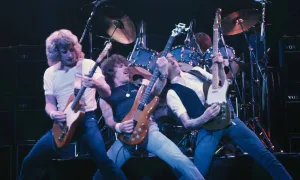 What inspired you to write “Down Down” (from “On the Level” -1974)?
What inspired you to write “Down Down” (from “On the Level” -1974)?
I was in Los Angeles and I had never been one for going out, I mean, I might have done it sometimes but it’s got less and less and less. I was sitting in a hotel room with a guitar tuned to G and I put a capo (ed: a small device that clamps onto the neck of a guitar and shortens the length of the strings, raising their pitch) on and I started playing: “Gi-Mi-Da-Ga/ Gi-Mi-Dini-Dini” and it’s a very nice feeling with this open tuning. I messed with: “Di-rli- dan/ Di-rli-dun/ Di-rli-dan”, which is very close to “Matchstick Men”: “Daaa-da/ Da da-da-da” and then I got a melody (ed: he sings) : “Aa/ Aa/ Aa/ Aa/ I want/ all the world to see/ Dadadada/ Dudududu”. I realised many years later I was copying “Matchstick Men” somewhat. I was sitting in a Travelodge (ed: hotel) on Sunset & La Brea, next to The Copper Penny, which is a place where I used to have a fabulous cheese on it, everybody had gone out because we had just gone to America for the first time and we were like: “Wow!” Even when the phone rang, it sounded fantastic; they didn’t ring like that in England and there was 24-hour TV and showers and two double beds in the bedroom, “Wow!” I stayed in the room, probably smoking and came out with “Down Down” and we did the lyrics when we got back to London.
I’ve read that “Down Down” was inspired by T. Rex’s “Deborah” (from “Prophets, Seers & Sages: The Angels of the Ages” -1968).
In a sense it was, because of (ed: he is humming the melody and the lyrics from “Down Down”) : “I want all the world to see/ To see you’re laughing, and you’re laughing at me/ I can take it all from you/ Again again” and it needed to be “Ddd, Ddd, Ddd” and I said we needed some: “‘Daba-ri-ba/ Daba-ri’, ‘Dddoo’, it has to be ‘Dddoo’”. So, it had no other meaning. I’m envious when people have deep meaning thoughts about this song. But I like pop music, I always loved pop music and the sound of “Daawba-ri-ba/ Daawba-ri-da”, I love that “Ddd-Ddd”. I quite liked Marc Bolan (ed: T. Rex frontman), I got on quite well with him and I said to the band: “We need ‘Ddd-Ddd”, something”. So, we went away that night and we carried on the following night writing another song, then next song and they said: “What about ‘Down Down’?” I said: “No” (laughs). “Down down deeper” (ed: he sings these lyrics from the song), it sounds quite good, doesn’t it? “What is the meaning?” I don’t know. It just sounds like: “Down down deeper and down/ lediridi/ Da-Da/Ddd-Ddd/ Ddd-Dtt”. Subsequently, I met people when that was #2 in the charts or something and a gal came up to me and said: “I love that record. My children love it, too”. I said: “That’s so great. How old are your children?” and she said: “3”. I said: “Ooh”. I suppose a little part of me thought: “They are 3 years old and they like this?!” but subsequently I found out that young children don’t have any other sheet in front of them (ed: figuratively), other than “Aaahh” (ed: genuine surprise). They just hear stuff and it goes in, so the “Ddda-Daaa/Deebra-Daan”, they can do it. So, there is something about young children, they don’t have any of that baggage that we carry as adults about self-awareness and all, they are just “Ddd-Ddd”, lovely. I have various children and grandchildren and you play music and you can see the “Aaah” (ed: the surprise in their face) and they ‘ve gone, they are totally wrapped up in listening to music. So, there is something to be said for when children pay attention to our own music, that there might be something there.
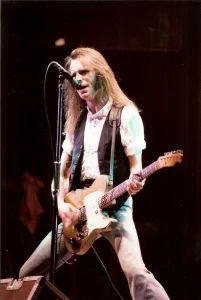 Did you have fun performing “Down Down” on Top of the Pops in 1975?
Did you have fun performing “Down Down” on Top of the Pops in 1975?
Yeah, pretty much. I never liked doing television in those days. We were used to very loud music and to do the physical moving thing, we needed loud monitors and sometimes you had to do one live vocal and mime and stuff. If this is very loud and you sing with a live mic, when it goes to air, there is a phonetic phase cancellation (ed: when two identical but inverted waveforms summed together will cancel the other out), so, the sound goes really small. So, if you have the monitors very quiet and sing, there is a better depth and a better sound to it. It was just another TV show, I was pleased that we were doing the TV, you knew that the TV would sell records and make the band get a little bit bigger, and as I said to you, after the “Matchstick Men”, the fight began and the fight has been going since then to “maintain or to be bigger”, “to maintain or to bigger”, or both and that’s what everybody is trying to do. Although some people like to say that they are musicians and I always say: “Why are you on the stage if you are not in show business? Get off the stage! You want to sell me what you are doing, unless you think you are that good. We are on the stage. You are in show business”.
Why didn’t you like the “Live!” (1977) album?
We did three nights and we weren’t very well-rehearsed and I always like to be rehearsed and rehearsing always pays off. At the time, people used to take notice of the audience sound, particularly in Glasgow, so more attention was paid to the sound that was coming out of the PA into the room and this was being miked up and used on the record. It’s about to come out I believe March this year, somebody has done a remix, but the remix has been done with direct signal from the amplifiers and for the first time, I think some of the album is really-really good; I was surprised. But most albums at the time were recorded live, they kept the noise of the audience in the room and then they would repair any problems and mistakes. I thought we were being really good by not repairing any mistakes; that was a mistake, because we were competing with every other live album at the time that was all played all over again. So, it sounds live but this has all been re-recorded. I shouldn’t say things like that but it’s the truth.
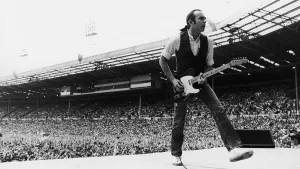 Was it an interesting experience to be the opening act at Live Aid in 1985?
Was it an interesting experience to be the opening act at Live Aid in 1985?
Again, we weren’t very well-rehearsed, we didn’t get on too well and we didn’t want to do it, nor did many people. Nobody quite realised how big it was going to be. That generation in the ‘80s, they had just discovered Third World poverty and Third World famine; my generation has heard about it when we were at school, I went to a Catholic primary school and we heard about it every year. In England the ‘80s was very much about money and there were bankers and so on… We finally got to do the show and Rick (ed: Parfitt -vocals, guitar; died in 2016) and I agreed to go on first because nobody wanted to go on first, it means you are at the bottom of the bill when you go on first. We thought we ‘d go on and be gone by 1 o’clock in the afternoon, we didn’t realise we wouldn’t be able to go out of the building. But we walked on and then there was the realisation seeing all the media and the feeling of the audience.
It was so unique. They were so part of this “all of us together doing something”, which I had never felt before and never felt again. Again, I thought it was a gig. “What are you doing?” “We are doing that gig”. “What time are we on?” “Midday” “Should we go on?” “We go on and we finish 12:15. Thank you. Goodbye”. You do stuff, you go on, you do it and you go. But we didn’t realise -nor did anybody realise- that gig was going to be that big and nobody realised that the newsreels would carry the opening everywhere around the world, all that day and probably the rest of the following week. So, we got so much press by going on first. We didn’t know that was gonna happen, that was really fortuitous. We had no idea that it was gonna be that way, nor did anybody else that was on, later on, because lots of people would say: “We go on first” and they shouldn’t have done perhaps.
Did you enjoy the “Magic Tour” with Queen in 1986?
I liked being with Queen, we knew Queen and I know Queen quite well. It was a comeback album for us because we split up and then we just made the “In the Army Now” album, so it was a very successful tour for us. Yeah, but remember, I said to you, people are finding weird that with me and with Rick, when he was alive, that it’s a gig. To me, there is no one gig more important than another gig, because if this gig is important, it means that just this gig here (ed: the next one) is not that important. They are all important. When we are on this is very important. Tomorrow will be very important. You can’t just say: “We are doing Glastonbury, we are gonna do something very special”. Why? What’s wrong with the day before Glastonbury? You mean the people in there are shit? So, every gig is very-very important. I think most performers would tell you that because you get out there and something happens. You are in front of people and something happens and becomes very-very important and I hate the idea when I always think of Glastonbury, I wanna do other gigs. The press, the media and such always ask: “Are you gonna do something special?” If I do something special for them, what about them (ed: the audience in other gigs)? Why are they not special? Why is yesterday not special? Why is tomorrow not special, but today is special because it’s a special gig?” While I speak, I go along with that myth: That the gig is more important than the acts. There are a few gigs around the world of that style, where the gig is bigger than the acts on it, to me that (ed: he gives the finger on camera) is not very good, but I’m just an act.
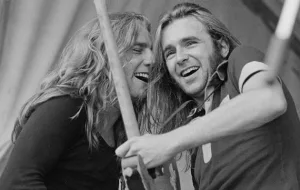 What are your thoughts about the “In the Army Now” (1986) single today?
What are your thoughts about the “In the Army Now” (1986) single today?
I love the song (ed: written by Bolland & Bolland), I always did love the song when I heard it. I understand that sometimes there are enough wars going on and I remember lots of people coming to us particularly from Scandinavia and Russia at the time, that parents whose children, all young ones, had gone to fight, had gone to war and some they were lost and some guys in Sweden just were going through military training; some of them saw it as it did them good, some of them hated it. Yeah, I love the song. I remember a kid in school getting in trouble, his name was Juke McCain, I hadn’t heard the name “Juke”, he was always getting in trouble, then running out of the classroom crying saying: “I’m gonna join the army”. When I heard that I thought (ed: he sings) : “Oooh, in the army…”, “I want to know how that guy feels”, because I’ve heard many stories about the conscription during World War II and World War I, where they ‘d go around the pubs when they guys were drinking and get all these guys to join together (ed: with excitement) : “Yeah! Yeah!” and then you wake in the morning “Oooh, you’re in the army…”.
This guy who seemed to be a nice man the night before, now is saying: “Man, get out of your fuckin’ bed! Just get out, shit!” The reality. I don’t think I would have coped with the reality of doing military service; I am a coward and very weak and wimpy. I very much respect people that can do that job for us. When we did a remake video for “In the Army Now” there was this Sgt. Elliott -I really liked him, there was just something about him- and for the first time ever and I must had been 40-some or 50-some, I saw this guy and I thought: “I can see why people would follow this sergeant major”. He had something. I mean, someone would say: “Subsequently, you may ‘ve gotten killed”, but there was something about him. If he told me to do something, I probably would. I have the greatest respect about him, we just were working for two days on a film with him. Again, life is a learning course, so, then I learned and understood how one man can make people following him. Why do they follow? I don’t know what he had, but I understood it. I talk too much, don’t I?
No, no, I like it. What was the secret of the great chemistry you had onstage with Rick Parfitt?
Not real chemistry, I just liked him a lot, we liked each other. It might have changed as we got older, but there was something: We could feel each other moving and something happened. We liked each other so much when we were younger and growing up we changed and it wasn’t as good as it was when we were younger, but we can’t get away from what it was like when we were younger. It was always great being on stage. When Rick first joined the band -there is a thing on the floor down there (ed: he points at somewhere in the room) writing “Status Quo first gig in 1967”- Rick didn’t learn the songs, so, he had to mime, he took the plug out of the amp and just mimed and everybody wanted to get rid of him, because he didn’t learn and perhaps we should have done, but I didn’t want to get rid of him because I liked him so much. I liked being with him and he liked being with me and then, as I said, you get older, success, girlfriends, wives, whatever infiltrate. You mentioned Eric Clapton earlier; Eric Clapton when he was on tour forbade anybody to bring their wives on tour because it does something and there is nothing against any one particular wife. The magic that happens with your band when you are young is that you put up a barrier to the rest of the world: It’s you against the rest of the world. Then success comes along, where you can afford to bring your wives along and then it started to dissipate. There is no longer this need for this unity, this tight fighting unit, as it was. It goes a little bit because whatever… and I don’t really understand what it is and what happens, but it happened with The Beatles as with everybody. It did even happen with The Bee Gees and they were brothers, so, all those things. So, yes, it was a joy being on stage with Rick, most of the time.
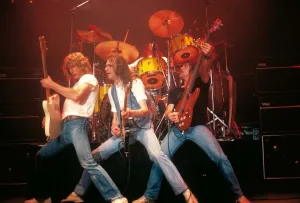 Was it an interesting experience to record The Beatles’ “Getting Better” for the film “All This and World War II” (1976)?
Was it an interesting experience to record The Beatles’ “Getting Better” for the film “All This and World War II” (1976)?
That’s interesting, I have never heard that question before. It was quite good. It was a famous producer, Lou Reizner (ed: Rod Stewart, The Who, he also gave Aphrodite’s Child their name) and I don’t know why we were asked to do it, but again, it’s something like a gig, something comes along, you are asked to do it, most things you say “No”, some things you say “Yes”, some things you shouldn’t have said “No”, some things you should have said “Yes”. But you do them and that’s that, it’s done. Sometimes people say: “Oh, you shouldn’t have done that, should you?” “No, we shouldn’t. Ok”. The Live Aid: “Good job you did on that one, wasn’t it?” “Yes!” You didn’t think it was gonna be good. So, you don’t know. It does look like from the outside sometimes like: “Great planning”. The people thought “Rockin’ All Over the World” (1977) was great timing. Well, if it was on time, as far as we are concerned, it would have been six to seven months earlier, so, the timing would have been wrong. We went to Ireland and John Coghlan (drums) broke his foot playing football, so, we couldn’t make a record. When “Rockin’ All Over the World” came out everyone said: “Great timing. Great timing” and we couldn’t say what really happened. This had nothing to do with us. So, I’m somewhat a believer in the Universal -if you wanna called it- God, whatever it is and it just happened. This meant to be there and so on. However that suggests that some unfortunate things that happen to people were supposed to happen, so, I don’t know.
Could you describe to us your love about your green Telecaster?
I used to play a Gibson 335 Stereo, before that I had a Guild Starfire, both guitars with humbucker pickups on them. I went to a gig one day and there is Pete Ham (ed: vocals, guitar, piano) from Badfinger, great band, I love them (ed: me too) and he had a Grimshaw which is shaped like a Les Paul and it was black to green, which was like a sunburst and I said: “I love it”. I kept telling him I loved it and he said: “I’d swap it with you if you like” and I said: “Yeah!” I should have said: “No” and I swapped it. Then, it turned out that it wasn’t as good as the Gibson and two or three weeks later, the bridge collapsed one day in the gig. It just collapsed, so, I couldn’t use it and the tour manager we had at the time was sent to Glasgow to rent or borrow two Telecasters and he borrowed two Telecasters. Two or three days later, we were about to leave Scotland and he had to take them back and I was doing a soundcheck and I said: “Which one should I keep? This one or the other one?”, he was in the audience, in the hall and he said: “That one” which was the sunburst one. I liked it and I got used to using it and I wanted it to be sanded down and painted it black and it looked great. Then, I got into a gig and it felt horrible, so, I sanded it down again and left it just bare.
Then, one day this paint came out which was very unique at the time, because you could paint wood and still see the grain. It sounds easy now, but when we were younger that was impossible. This is a paint, how can you see the grain? So, I painted this guitar. “Yeah!” and then I had to go to a gig, I put it back together again very quickly and went to the gig and I never changed it. It developed a great sound to it, I drilled a hole in it, so that jack plug wouldn’t keep pulling out. I had never ever looked after it and it was a fantastic guitar until about 10 or 12 years ago; it wouldn’t stay on tune any longer whatever we did because the neck is bolted at the back and there are only so many times you can repair it, so, then I changed over to a “Status” (ed: Graphite) guitar made like my guitar and I do miss that guitar. Telecasters are meant for those American country boys that can really play with a light string (ed: he makes a strident sound) : “Iiii/ Iiii”. It doesn’t have a vibrating sound. When you used vibrato, it’s such a strong guitar that nothing gives, whereas on a Les Paul or a Gibson SG, if I bend a string the body moves very slightly, so, it sounds better, whereas a Telecaster sounds (ed: makes a strident sound again) “Iii/ Iii” (laughs). But I love the guitar, I make great rhythm guitar noises, because I only really ever interested in playing rhythm guitar.
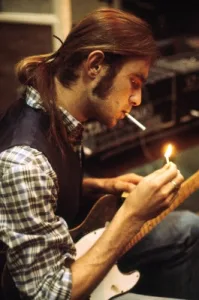 Lemmy from Motorhead said that “Mystery song” (from “Blue for You” -1976) is definitely in the top 5 rock ‘n’ roll songs of all time. It is flattering when you get comments like that from such great musicians?
Lemmy from Motorhead said that “Mystery song” (from “Blue for You” -1976) is definitely in the top 5 rock ‘n’ roll songs of all time. It is flattering when you get comments like that from such great musicians?
Yes, I know, but as I said to you: To Lemmy, that’s fantastic, but other people think it’s shit and that’s just weird. He thinks that. We were making the “Blue for You” album and we were into speed, and I gave Rick some and said: “Snort it” and he drank it and he drank too much one day, but we carried on making that album. I left him at 11:30 at night, sitting on a stool playing (ed: the riff of “Mystery Song”) “Tin-tin-tin/ Tin-tin-tin”. Me and Alan Lancaster (ed: bass -died in 2021) went home and got back the following day at 11:30 in the morning and he played: “tin-tin-tin/ tin-tin-tin”. I said: “You are early. I thought you would ‘ve been home yet” and he had been sitting there for 12 hours playing “tin-tin-tin/ tin-tin-tin”. Then, we finished the track and Rick went to sing it but whatever he did, it didn’t work out. So, him, Alan Lancaster and Bob Young (ed: co-writer for Status Quo) went to another room, so, I carried on the record. Then they came back with the lyrics, they are definitely Bob Young and I think Alan Lancaster helped him with the melody. I don’t think they were ever credited (ed: Bob Young did), but that’s how it came about and some people think it’s fantastic, other people think it’s uninteresting. But that’s what I said to you, that’s what happens with all music. There must be someone who when Tchaikovsky or whoever was, played their music, said: “That’s shit”. Someone must have said that, no matter how great we think he is.
A huge “THANK YOU” to Mr. Francis Rossi for his time. I should also thank Mrs. Lyane Ngan for her valuable help.
Official Francis Rossi website: https://www.francisrossi.com/
Official Francis Rossi Facebook page: https://www.francisrossi.com/
Official Status Quo website: https://www.statusquo.co.uk

